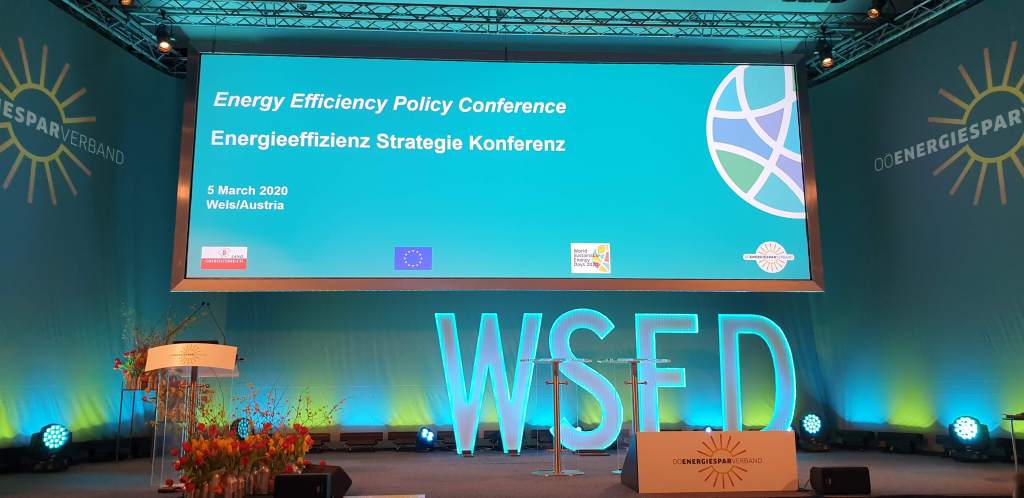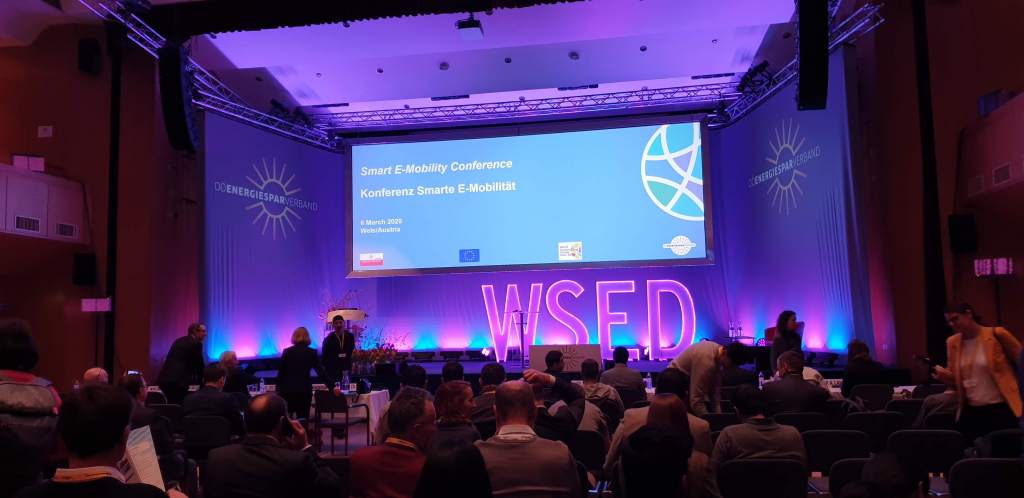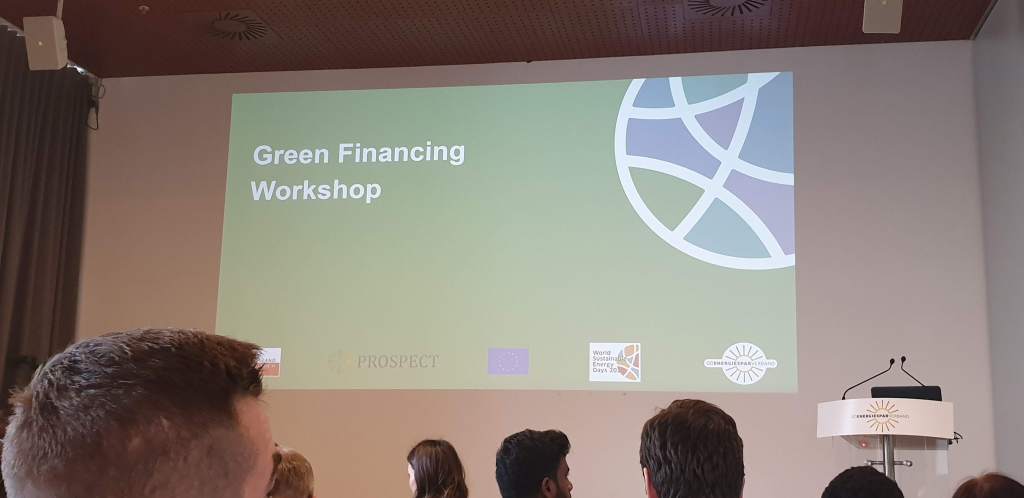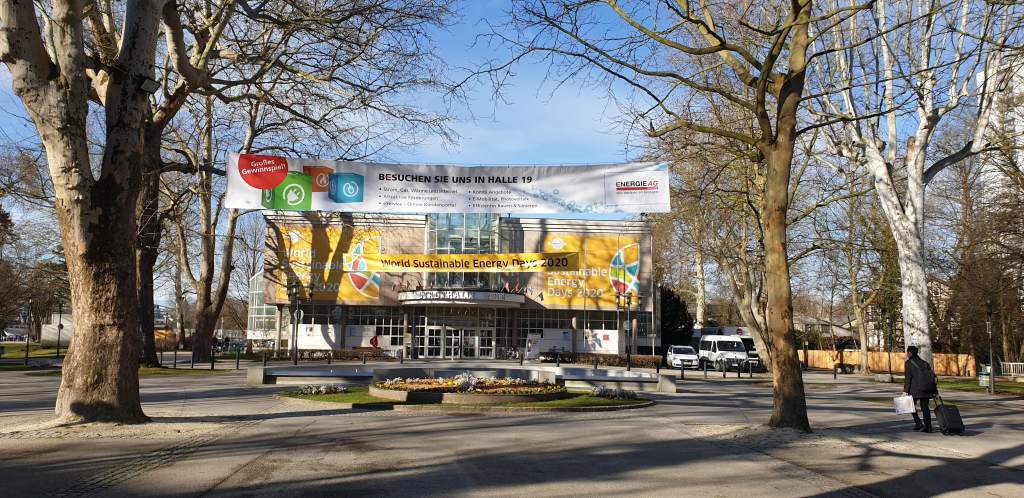 Share this!
Share this!The World Sustainable Energy Days (WSED) is an annual conference that takes place in Wels, Austria (Upper Austria). This year’s edition took place from 4-6 March. The WSED is a large event attracting at least 700 participants from 60 countries as well as a trade show that attracts over 100,000 people. AER and its delegates took part in the European Energy Efficiency Conference, taking part in the conferences in the Energy Efficiency Policy Conference, Green Financing Workshop and the Smart E-Mobility Conference.
AER invites you to fill out this EU-wide survey on Energy Efficiency. This survey should take no longer than 10 minutes to complete.
Energy Efficiency Policy Conference
During the conference, regional, institutional and industrial representatives provided their input on the topic of the EU Green Deal and how this would be done. For example, AER member region Upper Austria, which is an industrial region accounting for about 25% of all Austrian industrial exports (e.g. iron, steel, chemical industry) has a regional energy agency, OÖ Energiesparverband, that actively works to promote energy efficiency & renewable energy. Although the ambition of the European Green Deal is to reach a climate neutral EU wide by 2050, Austria’s ambition is to reach this climate neutrality by 2040. One of the main ways that this will be achieve in Upper Austria is through an increase of photovoltaic cells (solar power).
The European Commission were present during these conferences. Mr Rados Horacek from DG Energy gave a presentation on the European Green Deal. This was a very timely presentation as the Commission had proposed the new EU Climate Law on 4 March. The law sets out a binding objective of climate neutrality by 2050, however in order to achieve this, the 2030 target also needs to be amended to 50-55% emission reduction. Additionally, there would be an assessment of national measures every 5 years by September 2023.
Mr Horacek stressed, in his presentation, the importance of decarbonising of the energy sector as well as that buildings need to be more energy efficient. In order to achieve a climate neutral EU, there needs to be a larger share of renewables in final energy consumption. Additionally, it was found that buildings consume 40% of energy and 75% are energy inefficient. In conclusion, in order to achieve the EU climate objectives by 2050 (and 2030), decarbonisation of the energy systems is crucial.
Green Finance Workshop
The Green Financing Workshop was held in the context of the PROSPECT project – a Horizon 2020 project aimed to encourage the exchange of knowledge and experience on innovative financing schedules used to implement sustainable energy and climate plans. During this workshop, different regional and local authorities showcased their lessons and experiences in how they were financing sustainable energy schemes. There were several presentations showcasing what they do.
The energy agency of Upper Austria and the host of the Conference presented how the agency has a facilitation tool for scaling up of green finance. This facilitation tools helps identify the most promising projects and then to provide advice on technical and financial aspects, support in audits and guidance on procurement rules and contractual issues.
The Province of Girona located in Catalonia worked with BeEnergi and brought technical support to municipalities and bundled sustainable energy investments. BeEnergi, for example, offers a SME to MESCO training course. A MESCO is a micro energy service company that specialises in maintaining public lighting and municipal buildings and in supplying renewable energies. They also provided technical assistance in qualified work.
REScoop presented that some Belgian municipalities have a growing number of cooperatives where citizens are at the forefront in making the energy efficient projects happen. Rescoop which is short for renewable energy cooperative refers to a model where citizens jointly own and participate in renewable energy or energy efficiency projects. Members can share projects and given opportunities to buy the electricity at a fair price.
The presentation by Litomerice in the Czech Republic showcased that the use of revolving funds to finance their projects. The idea is to reinvest the financial savings acquired through energy efficiency projects into new energy saving measures. It rewards departments for energy savings efforts by allocating a portion of the saved money to them. It was estimated between 2014-2017, 300.000 EUR had been saved due to this revolving energy savings fund.
The last project was presented by SEM Energies Hauts-de-France, which showcased that the financing through regional co-investment. The organisation is a regional development tool in the promotion of renewable energies. All renewable energy production projects except wind farm are eligible for financial support with typical financial volume available between EUR 100,000 and 1 mill.
Smart E-Mobility Conference

On the final day of the conference, the topic switched to e-mobility including topics such as batteries, charging points and the EU Green Deal. Dr Gerhard Dell from the Regional Energy Agency of Upper Austria provided the Austrian context. In their region, for every 10 new parking spaces, there is also an obligation to foresee a charging infrastructure. There are both national and regional subsidies. The regional funding is for fast-charging stations in municipalities and intelligent charging stations in multi-family buildings.
Saki Gerassis from DG MOVE presented the strategies and policies for the development of sustainable mobility and transport. In his presentation, he noted that in order to achieve the climate neutrality goal, a 90% reduction in transport emissions is needed by 2050. In order to achieve and accommodate the increasing number of zero and low emission vehicles expected on the roads, 1 million public recharging and refueling stations are needed by 2025.
However, a multimodal strategy and approach is needed. For example, the railway system is already electrified to a large extent and could aim at climate neutrality in 10-15 years. There is a push for biogas and -egas in maritime transport as well as electricity and low-carbon hydrogen in inland waterways and short-sea shipping. For the aviation industry, advanced biofuels and e-fuels are the only realistic option for decarbonisation.
A very important point that was made by Jayson Dong from AVERE (European Association for Electromobility) was that not only is there a need for increase recharging and refueling stations but also fast charging stations.
Conclusion
A very well attended conference with representatives from public, private and industrial sectors. All measures were taken in accordance in the prevention and spread of COVID-19. AER is very happy to take part and looking forward to next year’s edition which will take place from 24-26 February 2021. The call for papers have been opened with a deadline of 12 October 2020.


